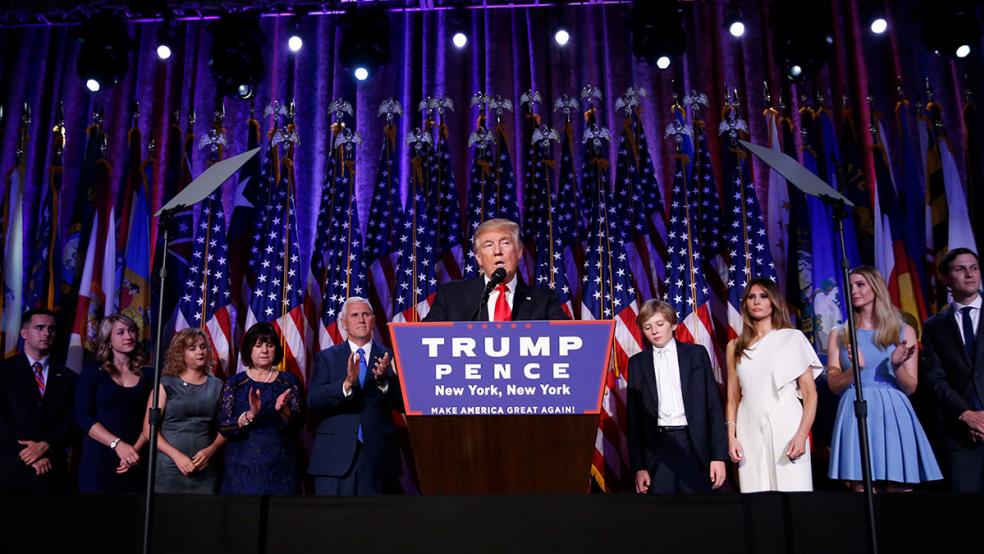Let’s be honest: At this point, who the hell knows anything? Donald Trump’s stunning victory in the race to become the 45th president of the United States leaves only questions — questions about the path forward for a deeply divided nation, the future of American democracy and the outlook for the U.S. and global economies.
The only certainty is that those profound uncertainties are bound to unnerve a great number of Americans as well as countries and markets worldwide, and far more than the shocking Brexit vote in June did.
Related: 5 Reasons Why Trump Won the Election
Voter anxiety runs high about Trump — the first president to never have served in public office or the military — and indicates just how much hinges on his actions now, and those of his supporters.
Job No. 1 will be to unite the country, or at least prevent the divisions that were amplified by the election from dissolving into waves of hate and fear. Trump sounded gracious and conciliatory notes in his victory speech just before 3 a.m. ET, congratulating Hillary Clinton for a hard-fought campaign and expressing gratitude for her service to the country.
“Now it’s time for America to bind the wounds of division. We have to get together. To all Republicans and Democrats and Independents across this nation, I say it is time for us to come together as one united people. I pledge to every citizen of our land that I will be president for all Americans, and this is so important to me.”
But how can Trump be president of all the people when the policies he has advocated as a candidate, and the manner in which he has advocated for them, are anathema to roughly half the population? The Trump win was unexpected in large part because it defies the broader demographic direction of a country that is growing more diverse and multicultural, more secular and more progressive on social issues like gay marriage, as Eurasia Group President Ian Bremmer pointed out. It is so historic because it runs against the tide of our recent history.
Related: After Shocking the World, President Elect Trump Must Prove He’s Up to the Job
Now comes the real work, and it will take much more than one speech to reassure the American public and a skeptical world, which Trump also seemed to acknowledge. “It’s been what they call a historic event,” Trump said early Wednesday morning. “But to be really historic, we have to do a great job.”
For the more than 60 percent of voters in exit polls who believe the president elect isn’t qualified and doesn’t have the temperament to be president, Trump has an awful lot of work to do to convince them that he is indeed capable.
Even many of those who voted for him doubt his fitness for office. “Trump has no experience in government, and his tenure as President will likely be marked with unconventional, and potentially erratic, policymaking that departs substantially from the political modus operandi of the past, whether Republican or Democrat,” a Citigroup analyst wrote after Trump’s win.
Is Trump even remotely up to the task? How will he lead, and can he possibly bring the country together after years of rising partisanship and months of bullying, bigoted and belittling campaign rhetoric? Will he be able to deliver on his core campaign promises — to build a wall on the border with Mexico and get our neighbor to the south to pay for it, deport criminal undocumented immigrants, crush ISIS, generate annual GDP growth of 4 percent or more, create 25 million jobs over 10 years, rewrite trade agreements, reform the tax code, both repeal and replace Obamacare, “drain the swamp” of Washington corruption, rebuild American infrastructure and renew the American dream. Unlikely.
Related: 11 Huge Questions Americans Face Under President Trump
It’s possible that Silicon Valley billionaire Peter Thiel was right when he argued that the media erred by taking Trump literally but not seriously while voters took him seriously but not literally. But if that’s true, what policies can Americans reasonably expect Trump to pursue? Or are we all simply supposed to have faith that our Great Leader will, by virtue of his character and his business record, take us down the true path to exceptionalism?
Whether Trump can unite Americans and find a way to govern is also unclear because Trump’s win leaves both the Republican and Democratic parties frayed. Will establishment Republicans and conservatives who sought to distance themselves from the president-elect rally to his side? And even if they try, will Trump seek vengeance for their lack of support?
Will fiscal conservatives challenge the elements of his agenda, as vague as it may still be, that they fear will lead to ruin? Will a Republican Congress challenge Trump’s use of executive power at home and in dealing with other nations? Will fellow Republicans step up if they fear he will hurt the republic? Which Democrats will emerge as the next generation of standard bearers of the party as it looks to recover from a devastating defeat?
There are too many questions to count. Trump’s political earthquake has shaken things up. How things shake out won’t be clear for a good long while.






